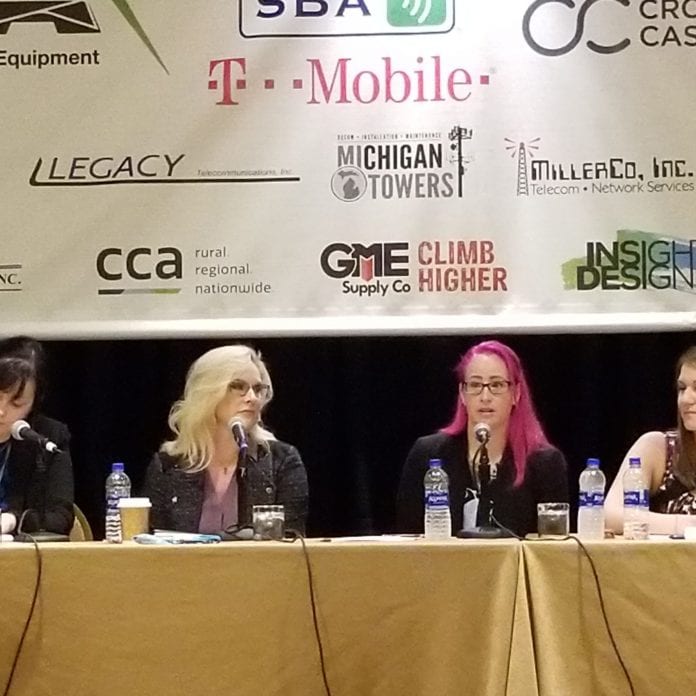NASHVILLE, Tenn.–Danielle Meyers likes the view from the top — of the cell tower, that is.
Meyers, a lead tower technician for six years for MillerCo, is based in Texas and the company’s only woman tower climber in the field. She was part of a panel on women in the tower industry held at the National Association of Tower Erectors conference this week, with participants discussing how they ended up in their careers and some of the issues they face as women succeeding in a male-dominated industry.
Meyers said that she had no idea tower climbing was a career option until she ended up helping out a friend who was a climber and needed a support person on the ground — and when she expressed interest in climbing,he told her that most men couldn’t do the job, much less a woman. She took that as a challenge, and now climbs towers to install and repair lighting systems. Meyers acknowledged that she isn’t as physically strong as her male counterparts, but said that leads her to creative strategies and solutions so that she can get the job done, while also being “obsessive” about proper paperwork, an organized schedule and safety on her job sites.
“These guys are not just my tower crew or work crew, they are my family — and I will be damned if they aren’t going to go home at the end of the day,” Meyers said.
Meyers had several pieces of advice for women interested in tower climbing: they will have to work harder than everyone around them in order to prove themselves; they can’t get offended (“That is the deal. Take it or leave it,” she added); and they need to stand up for themselves, because no one else will. She also didn’t recommend the job to mothers, because of the long weeks and even months away from family — although she was quick to add that mothers can certainly do the job and could make it work.
Jeanne Piercy, co-owner and director of operations at Pier Structural Engineering Corp., related her story of being told by a teacher in 11th grade that “girls can’t do physics,” and how she went on to prove that teacher wrong — both in his class and in her choice of higher education, where she studied chemistry, math and eventually environmental engineering. She worked as an engineer and eventually joined her husband full-time after he started PSEC. Piercy emphasized the need to have an “open growth mindset” and for men in the industry not to underestimate the capabilities of women — who may start out as administrative assistants as an entry point, but are capable of much more if given the opportunity. Heather Gastelum, T-Mobile US’ senior manager for national tower safety and operations, said that she has spent most of her career as the only woman in a room and still runs into engineers who are surprised when she pushes back, with knowledge and experience, on tower design.
Meyers said that it was a matter of luck that she even heard about the career that she now loves, and said the industry needs to work on educating woman about opportunities in the tower industry — which is part of what Women of NATE, which started last year with a panel and expanded its activities at NATE Unite this year, aims to achieve. Andrea Lee, who is Women of NATE’s chairwoman and moderated the panel, said that she is optimistic that in an industry which is used to moving quickly to evolving to support new technologies, change can be achieved without a long wait.

